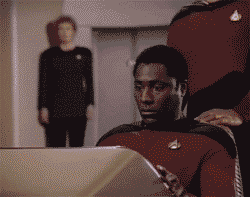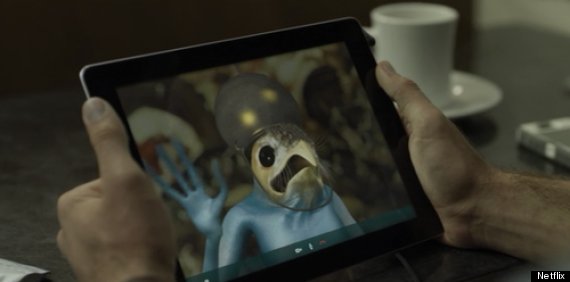Tuned In: Why Is Television Still So Bad At Understanding The Internet?
CSI: Cyber's dim-witted conception of the internet starts with their use of the word "cyber". It doesn't get much better from there.

Tuned In is Junkee’s fortnightly TV column. This instalment contains no spoilers.
–
We’ve been doing this whole ‘internet’ business for some time now, really. Long enough for OMG to be in the OED. Long enough for it to be a record of Millennial’s entire lives (suck it young people, and your indelible public record of teen awkwardness!). And long enough for newsreaders to stop saying ‘The Internet’ very carefully, like it was a foreign word they might accidentally morph into a racial slur.
So why don’t TV shows seem to get it? If future archaeologists were to be forced to reimagine our world from a loaded PVR, they’d come to the conclusion that the internet was a collection of sweaty nefarious men twirling their moustaches, bubbly vapid teenagers girls flicking their hair, or, even more likely, the former masturbating over the latter.

The fourth child of the CSI family has just been birthed; it’s name is CSI: Cyber, and it is… odd. As a procedural, all the elements are in place. There’s steely eyed detectives, a chase scene that could believably be undertaken by middle-aged people in suits, and impenetrable cases that crack open once it’s revealed that somebody is banging their neighbour. Patricia Arquette makes the highly unusual choice of following up an Oscar win with a network procedural and does a good job of it; James Van Der Beek is charming enough to make you think you might have been wrong about being Team Pacey. On a basic genre level, it works just fine.
The parts that work less well are the “cyber” parts — that is, the whole premise of the show. Even the fact they use the word “cyber”, which went out of use around the same time as phrases like “internet super-highway” and “hang on, I’ll just Ask Jeeves“. Everything about the online world is portrayed as debaucherous, nefarious, dangerous; it’s a dark wood we’ve wandered into carelessly, where we’ve encountered something unspeakably wicked. Every plotline appears to be about an all-American family who accidentally let the internet into their homes, and paid the ultimate price. It’s the internet as described to your parents in the early nineties; if you went online it was only to learn how to make a bomb, and even then you’d get sex-kidnapped.
“Oh those poor parents, they buy a baby cam to protect their child, and it’s the very thing that gets the child abducted. That is truly horrifying.”
– Patricia Arquette, hacker/detective
It’s distinctly possible that nobody on this show is even on Facebook, let alone knows anything about computer crime. Lines like, “I checked the internet headers on the email” and, “so the motherboard is our murder weapon!” make absolutely no sense. I can almost picture a script line reading “SLEUTH: binary code crack encrypt rhubarb rhubarb rhubarb NB — fix later”.

“Now, everyone wave and say hi to Grandpa SexTerrorist!”
It’s understandably difficult to translate the online space into interesting television. People sitting away typing at computers isn’t particularly visually compelling no matter how many of them there are, nor can you really tell what they’re doing — which is why we can all pretend to be working hard while researching our next holiday or getting involved in heated brawls about whether or not Rihanna is a feminist.
But it’s not only TV shows that attempt to delve into the internet that don’t quite grasp it; it’s an area that seems misrepresented on TV as a whole.
The worlds inhabited by Serious Cable Drama are noticeably low on technology. There’s obvious reasons for this in shows like The Walking Dead, Downton Abbey, Boardwalk Empire, Mad Men, and Game Of Thrones (although enjoyable hours can be spent imagining what social media would be like in Westeros: Namely, Cersei would be Queen of Twitter; Sansa would be a serial attention-seeking-status offender — “it’s always darkest before the dawn. Stay strong!”; Ramsay Bolton’s feed would be nothing but ball-smashing Fail videos; Brienne would earnestly link to worthy causes; Sam would like everything everyone posted; and Margaery would have one of those insufferable, selfie-heavy Instagram feeds you only follow so you can bitch about it. Jon Snow would never post anything and you’d lose hours trawling through old profile pics to see if he had a girlfriend.)
Even the shows set in modern-day worlds are not overly infused with technology. There’s the odd mention in Breaking Bad, but no interaction with the exploding market of the online drug trade. It’s hard to imagine anyone from True Detective online; this series busts a cam-girl business, but even that looks like a traditional brothel. These tough noiresque detectives like their sex in the flesh, thankyou very much.
If you survey the various universes presented to us on television, it’s hard to avoid the sense that the internet is inherently silly; a place for vapidity, frippery or used underwear sales, rather than meaningful connection or useful information. The most derisive was The Newsroom. While never being averse to suggesting that people were infinitely less intelligent than himself, Sorkin saved the worst of his ire for the digital journalists and online leaks. When he begins to warm to his online journalist, Will shows his appreciation: “You are Neal Sampat,” he says earnestly. “You are now worthy for me to speak your name, dark skinned child.” (He may not actually mouth the last sentence, but I distinctly heard his forehead say it).

House Of Cards doesn’t seem to think the online space is silly, but does see it as dark and deceptive to an extremely silly degree. Although to be fair, this is the way House Of Cards views everything — namely politics, train stations, the Deep South, America, Kevin Spacey’s voice.

“Hello, I am internet.”
Comedies, on the whole, seem to understand the medium far better. The Broad City girls Skype constantly; The Mindy Project’s Mindy Lahiri wants “to be loved in a way she can brag about on Instagram”; Selina Meyer’s Veep team constantly frets about what is trending on Twitter; Girls’ Hannah and Marnie discuss whether a guy g-chatting you is more or less noteworthy than emailing you. And, by their very nature, the Silicon Valley team are au fait with the online space, if less so on absolutely everything else.
But there’s only one drama I could think of which has a remotely interesting perception of the internet. From its earliest days as a simple legal procedural, The Good Wife lifted itself above its competitors with a steady flow of legal cases that explored the brave new digital world in which we live. Analogues of real companies like 4chan and Bitcoin were clients, and Alicia and her team presented cases regarding privacy, copyright and surveillance with their distinctive cool-headedness and even-handedness. The creators of the show see the online world for what it is; one full of both unique circumstances and challenges, motivated by the same old common human desires that drive the physical world.
That’s a rare exception; on the whole, there’s a distinct sense that TV showrunners believe the online world to be beneath them, in either an intellectual or a moral sense. It’s a particularly ironic hierarchy: it’s only been in the past decade or so that television as a medium has received critical attention, rather than being seen as cinema’s poorer cousin. Perhaps, now finally accepted as legitimate, they’ve turned their withering gaze to the next mass medium. Movies are full of snide references to couch potatoes, sitting at home, channel surfing; now TV writers can throw shade back. “You people here are watching a real story,” they tell the audience. “Everybody else is just browsing.”

–
CSI: Cyber is on Channel Ten, Sundays at 9pm.
–